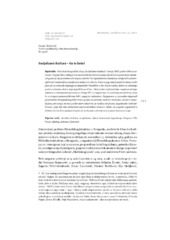Socijalizam i kultura – šta to beše?
Socialism and Culture – Do We Remember it at all?
Апстракт
The immediate motive for organizing the Belgrade symposium “Socialism and Culture” held in late 1969 were prohibitions. After June 1968 there were about forty political interventions in Serbia (while there had been none in the previous twenty years), considerably more than in other Yugoslav republics. The conclusion that was reached was that cultural life was provincialized and underdeveloped. The author in this paper extends the topic to a more global level since the intentions of the dialogue allowed for that. Data on Goli Otok, provided by Milovan Đilas, fit well with these facts. The Otok was the most drastic and dramatic prohibition in the entire history of the Second Yugoslavia. From both contemporary and present-day perspectives, the symposium may be interpreted as a cry for freedom. In this conversation, the members of the Belgrade wing of the Praxis group played a crucial role. Some of these same people would later participate in the events infamously marking the 1990s, above ...all the civil and religious wars. The Zagreb “headquarters” of Praxis was, on the contrary, never affected by the nationalist virus. Finally, arguments are proposed about Dobrica Ćosić as the Serbian Faust, and the thesis of this writer being the Father of the Nation is contested.
Кључне речи:
LCY Program / League of communists of Yugoslavia / socialism / culture / societyИзвор:
Filozofija i društvo/Philosophy and Society, 2012, 313-332Институција/група
IFDTTY - JOUR AU - Bošković, Dušan PY - 2012 UR - http://rifdt.instifdt.bg.ac.rs/123456789/595 AB - The immediate motive for organizing the Belgrade symposium “Socialism and Culture” held in late 1969 were prohibitions. After June 1968 there were about forty political interventions in Serbia (while there had been none in the previous twenty years), considerably more than in other Yugoslav republics. The conclusion that was reached was that cultural life was provincialized and underdeveloped. The author in this paper extends the topic to a more global level since the intentions of the dialogue allowed for that. Data on Goli Otok, provided by Milovan Đilas, fit well with these facts. The Otok was the most drastic and dramatic prohibition in the entire history of the Second Yugoslavia. From both contemporary and present-day perspectives, the symposium may be interpreted as a cry for freedom. In this conversation, the members of the Belgrade wing of the Praxis group played a crucial role. Some of these same people would later participate in the events infamously marking the 1990s, above all the civil and religious wars. The Zagreb “headquarters” of Praxis was, on the contrary, never affected by the nationalist virus. Finally, arguments are proposed about Dobrica Ćosić as the Serbian Faust, and the thesis of this writer being the Father of the Nation is contested. T2 - Filozofija i društvo/Philosophy and Society T1 - Socijalizam i kultura – šta to beše? T1 - Socialism and Culture – Do We Remember it at all? SP - 313 EP - 332 DO - 10.2298/FID1203313B ER -
@article{
editor = "Milidrag, Predrag",
author = "Bošković, Dušan",
year = "2012",
abstract = "The immediate motive for organizing the Belgrade symposium “Socialism and Culture” held in late 1969 were prohibitions. After June 1968 there were about forty political interventions in Serbia (while there had been none in the previous twenty years), considerably more than in other Yugoslav republics. The conclusion that was reached was that cultural life was provincialized and underdeveloped. The author in this paper extends the topic to a more global level since the intentions of the dialogue allowed for that. Data on Goli Otok, provided by Milovan Đilas, fit well with these facts. The Otok was the most drastic and dramatic prohibition in the entire history of the Second Yugoslavia. From both contemporary and present-day perspectives, the symposium may be interpreted as a cry for freedom. In this conversation, the members of the Belgrade wing of the Praxis group played a crucial role. Some of these same people would later participate in the events infamously marking the 1990s, above all the civil and religious wars. The Zagreb “headquarters” of Praxis was, on the contrary, never affected by the nationalist virus. Finally, arguments are proposed about Dobrica Ćosić as the Serbian Faust, and the thesis of this writer being the Father of the Nation is contested.",
journal = "Filozofija i društvo/Philosophy and Society",
title = "Socijalizam i kultura – šta to beše?, Socialism and Culture – Do We Remember it at all?",
pages = "313-332",
doi = "10.2298/FID1203313B"
}
Milidrag, P.,& Bošković, D.. (2012). Socijalizam i kultura – šta to beše?. in Filozofija i društvo/Philosophy and Society, 313-332. https://doi.org/10.2298/FID1203313B
Milidrag P, Bošković D. Socijalizam i kultura – šta to beše?. in Filozofija i društvo/Philosophy and Society. 2012;:313-332. doi:10.2298/FID1203313B .
Milidrag, Predrag, Bošković, Dušan, "Socijalizam i kultura – šta to beše?" in Filozofija i društvo/Philosophy and Society (2012):313-332, https://doi.org/10.2298/FID1203313B . .



